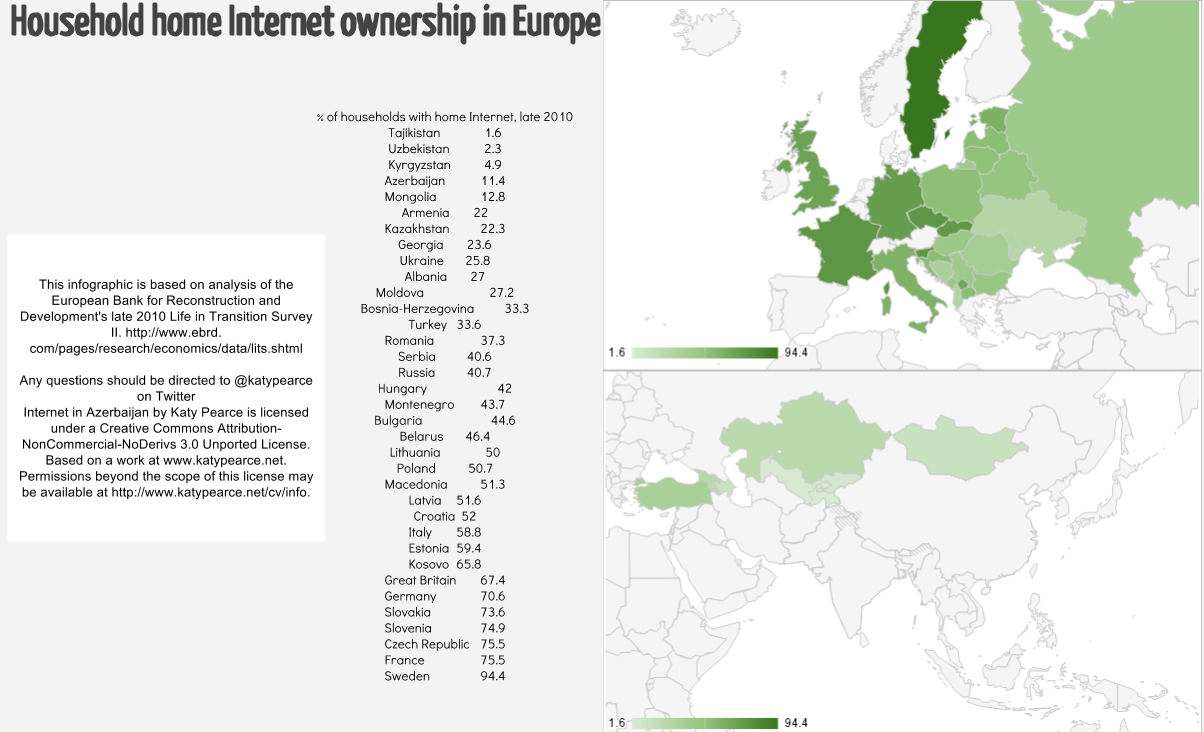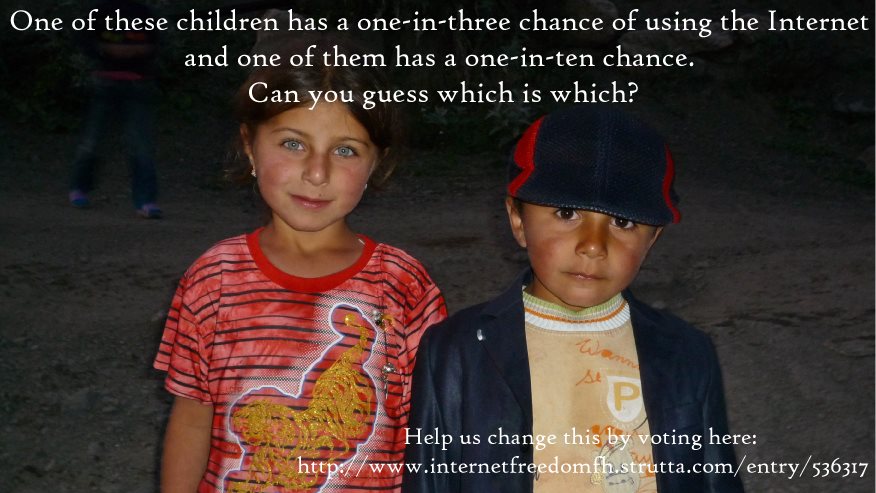Journalist mulls challenges of developing internet media in Azerbaijan
BBC Monitoring International Reports – Tuesday, November 6, 2012
Azerbaijan is following the example of influential international media agencies and is increasingly moving its news content to the Internet , the Day.az website quoted Aynur Qasimova, head of the English service of the Trend news agency, as saying at a media forum in Baku. She said that the Internet has become a major source of information in Azerbaijan , where 65 per cent of the population uses the net. She went on to say that while many countries in the world adopted laws to regulate Internet content, no such laws exist in Azerbaijan . She added that media censorship is non-existent in Azerbaijan . Qasimova also deplored “irresponsible” behaviour of some new media reporters, which she said often “plays into the hands” of the opposing Armenia. The following is an excerpt from an unattributed report by Day.az website on 5 November headlined “Head of the English service of Trend news agency: Azerbaijani media rush to the Internet “. Subheadings inserted editorially:
“Azerbaijani media are developing in line with global developments. Similar to influential international media agencies, Azerbaijani media are also increasingly moving their news content on to the Internet ,” head of the English service of the Trend news agency, Aynur Qasimova, has said.
This is an absolutely symptomatic process for Azerbaijan , an economically viable country following global tendencies, Qasimova said as she addressed the seventh international Internet Governance Forum in Baku on Monday [5 November].
She said that the point is not quality of information in traditional and electronic media, but the fact that a modern person simply has no time to receive information through traditional media. In terms of electronic media, Azerbaijan is now using experience of developed countries, which is a significant step towards understanding the future of Azerbaijani journalism, Qasimova said.
Internet major source of information in Azerbaijan
“Today internet portals have become major sources of information. The total circulation of newspapers in Azerbaijan is 5,000-10,000 copies at a time when about 50,000 people visit the websites of these facilities on a daily basis. The state cannot ignore such an important tendency – recently it became obvious that there is a necessity to boost interest in the development of online media,” she said.
Qasimova argued that increasingly many readers receive information from the Internet . “According to the Press Council statistics, in our country about 100,000 people give preference predominantly to this source of information. At the moment, 65 per cent of Azerbaijani population use the Internet and 35 of the population are regular users of the net. About one million people use Facebook. In addition, at the moment, 23 out of 50 most visited sites in the country are Azerbaijani websites – of these16 are news sites. Over 15,000 websites are registered under the AZ domain. Over 4,700 media outlets are registered at the Justice Ministry. These figures point to active development of media in Azerbaijan in the context of the challenges any developing country is facing at the moment. Over the past years internet media has been shaping and developing at an extremely rapid pace. These projects justify themselves in Azerbaijan not only in terms of demand but also in terms of economic profitability,” she said.
No media censorship in Azerbaijan
Speaking about the development of electronic media, Qasimova focused on the possibility to restrict dissemination of information on the Internet . “In reality, there are many countries, including developed and democratic ones, where freedom of speech is restricted on the Internet either through a direct ban or through special laws. A number of post-Soviet countries also adopted laws regulating Internet content. No such laws operate in Azerbaijan . Media censorship was removed as early as in 1998 and today neither traditional, nor internet media are subject to censorship. Moreover, according to experts, the law “On Sources of Mass Media” operating in Azerbaijan at the moment, is one of the most liberal in Europe. In due time, this document was prepared within the frames of the cooperation with international organizations and it completely draws on the modern tendency according to which freedom of speech and plurality of opinions are fundamental principles that need to be upheld on the Internet . To be more precise, there are no specific laws regulating internet content in Azerbaijan . These issues are regulated by laws on media, fight against terrorism, cyber crime, etc. At the same time, it is important to appreciate that the need to regulate the Internet in terms of [dissemination] of scenes of violence or pornography, as well as blatantly false or unverified information, constitute social demand from the public,” Qasimova said.
Azerbaijan should continue its cooperation with the EU, the Council of Europe and the OSCE is terms of international institutions facilitating the development of information and communication technologies and the shaping of the online media in this country. At the moment, the OSCE’s Baku office is hosting regular online-TV courses to raise the awareness of the youth in this aspect, Qasimova said.
In addition, issues of accountability, professionalism and training of journalists are significant factors in the development of internet media. Qasimova said that absence of a law regulating the Internet should not encourage journalists to act irresponsibly. “For some media, numerous lawsuits filed against them have become a matter of prestige. In addition, many journalists use their time spent in police departments to shape their image which then they successfully use to further their interests. It is inadmissible when interests of separate individuals are used to the detriment of the image of the country,” Qasimova said.
Journalists’ unprofessionalism plays into Armenia’s hands
She stressed that for Azerbaijan this is a significant issue, not least due to the fact that the country is in a state of perpetuated conflict with the neighbouring Armenia. “At a time when 20 per cent of the territory of the country is occupied, journalists’ professionalism is not only an issue of morals. Unprofessionalism of journalists or anyone else who circulates information in new media may play into the hands of the opposing side. It is important to bear in mind that progress in the development of information technologies has led to the emergence of new forms and styles of information publication. And this means that reporters of new media are not always prepared to observe professional standards, which have been elaborated and tested throughout the history of journalism. When it comes to the publication of information, issues of attracting readers and the speed of the new media are often placed above professionalism today. In addition, information that appears in the new media is less accurate because it might not be checked as thoroughly as reporter materials are checked with editors in newspapers and TV companies,” she said.
In addition, it is very important to organize large-scale discussions on issues of internet media with due consideration of all nuances. To this end, regular meetings and discussions are being held alongside international institutions in Baku and this tendency should be preserved, she said.
[Passage omitted: Qasimova speaks about Trend]
Original Language: Russian
Section: Azerbaijan , Armenia and Georgia
Index Terms: AZERI ; INTERNET ; MEDIA ; AZERBAIJAN INTERNATIONAL ORGS ; MEDIA ; DOMESTIC POLITICAL ; INTERNATIONAL POLITICAL
Original Source: Day.az website, Baku
Record Number: 14269434B5912280
Source: Day.az website, Baku, in Russian 0805 gmt 5 Nov 12/B



